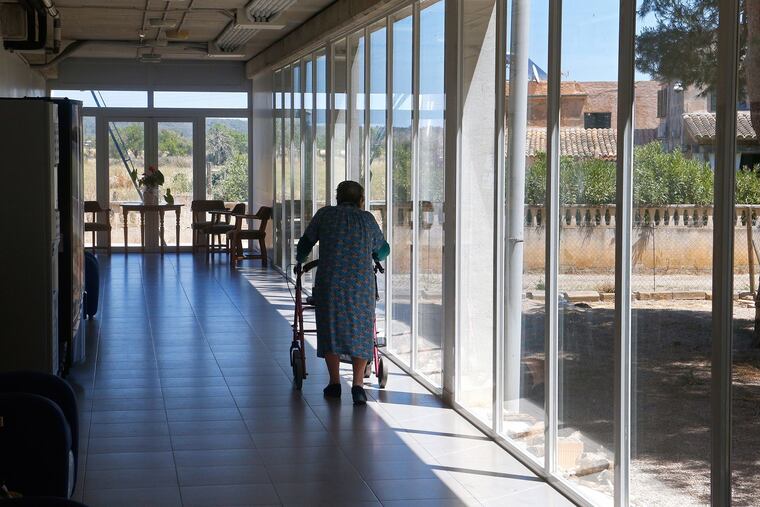The White House proposed staffing requirements for nursing home. What would that mean for Pennsylvania?
SEIU Pennsylvania, a union representing nursing home workers, applauded Joe Biden as the first president to focus on the issue in decades.

President Joe Biden’s administration has proposed nationwide minimum staff requirements for nursing homes that exceed the current staffing level that facilities in Pennsylvania are newly required to meet.
The Centers for Medicare and Medicaid Services’ proposed rule would require that each nursing homes have a registered nurse on site at all times. It further requires that each resident receive 33 minutes (0.55 hours) of direct care each day from a registered nurse and an additional two hours, 28 minutes (2.47 hours) of direct care from a nurse aide.
Pennsylvania already regulates nursing home staffing levels, and this summer rolled out the most significant update of these rules in decades. Since July 1, the Pennsylvania Department of Health has required all long-term care facilities to provide 2.87 hours of direct care to each resident daily, up from the 2.7 hours of daily direct care had to provide prior. The hours of care are not divided by type of provider.
A bigger jump to 3.2 hours of direct care per day is scheduled to go into effect in Pennsylvania on July 1, 2024.
Pennsylvania’s regulations also require specific staff-to-patient ratios for registered nurses, licensed practical nurses, and nurse aides. That makes it difficult to compare the overall hours of direct care required in the state to the proposed rule, which does not, for example, require minimum care time from licensed practical nurses.
Biden’s proposal acknowledges that other types of works also provide essential care in nursing homes, and estimates that when they are accounted for residents will receive roughly four hours of care daily, more than Pennsylvania’s next jump will require.
» READ MORE: We want to hear your thoughts about this and other health-related articles. Please fill out our Eds and Meds survey.
Dangers of low staffing in nursing homes
The COVID-19 pandemic highlighted how the low staffing levels in nursing homes played a role in the high numbers of COVID-19 deaths within many facilities. At the same time, profit-driven private equity firms have been purchasing nursing homes, a trend that caught the ire of the White House.
“And as Wall Street firms take over more nursing homes, quality in those homes has gone down and costs have gone up,” Biden said in his 2022 State of the Union remarks.
The proposed staffing requirement is the flagship item in a list of actions the White House announced Sept. 1. Others include more robust enforcement of existing standards and increased transparency of nursing home ownership.
“We have a president who put this issue on the map for the first time of any of our lifetimes,” said Matthew Yarnell, president of SEIU Healthcare Pennsylvania, a labor union that represents thousands of nursing home workers.
Yarnell said the proposed rule represents real progress, and he believes it will help bring back nurses and aides who left positions at nursing homes because they were charged with taking care of too many people.
» READ MORE: Stricter regulations for staffing of Pennsylvania nursing homes go in effect this Saturday
Not enough or unfunded mandate?
Voices from both side of the debate expressed disappointment in the proposed rules.
Some experts and nursing homes advocates said the proposal doesn’t go far enough. Many advocacy organizations, including the American Nurses Association, recommend that each nursing home resident receive at least 4.1 daily hours of direct care.
“There are some real positives in here, but I wish the administration had gone further,” David Grabowski, a professor of health care policy at Harvard Medical School, told KFF Health News.
National industry groups admonished the White House, saying that if finalized, the proposal would force nursing homes to close.
“We hope to convince the administration to never finalize this rule as it is unfounded, unfunded, and unrealistic,” said Mark Parkinson, president and CEO of the American Health Care Association, a nursing home industry group, said in a statement.
In Pennsylvania, nursing homes have been struggling to find the staff to meet the much lower requirement that took effect in July, said Zach Shamberg, president and CEO of the Pennsylvania Health Care Association, the AHCA’s state chapter.
He cited as a problem that Pennsylvania did not increase the rate at which the state’s Medicaid program reimburses nursing homes enough to cover the extra cost of labor, Shamberg said. He is concerned that the new proposed federal rule doesn’t come with funding attached, while requiring many more workers.
“This is an unfunded mandate on an industry that can’t afford another unfunded mandate,” Shamberg said.
» READ MORE: Sen. Bob Casey worries that nursing homes are ‘uninspected and neglected’
About two-thirds of nursing homes nationwide would have to hire nursing aides, and one-third would have to hire registered nurses to meet the proposed standards, the White House said.
Low reimbursement rates are a challenge for many nursing homes, said Rachel Werner, a health economist and executive director of the Leonard Davis Institute of Health Economics at the University of Pennsylvania. But she is skeptical that all nursing homes are spending all that they can on staff that provides direct care.
“Private equity is coming into nursing homes, so they clearly see the opportunity to squeeze revenues,” Werner said.
Werner considers most important the strong evidence that increasing staffing levels in nursing homes improves quality of care and outcomes for resident, and current staffing is just too low.
“This change to increase the levels is a long time coming and sorely needed,” she said.